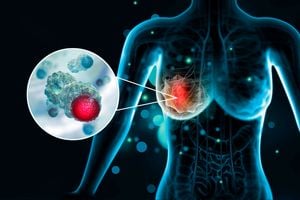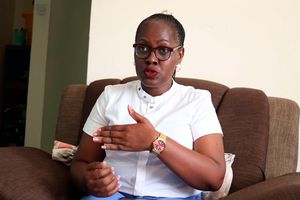
From left: Wangu Githui, Aileen Ithima and Annabelle Kanyari.
This kind of breast cancer arrives subtly, through itchiness, discolouration, and persistent changes too easily dismissed. Their stories echo with themes of misdiagnosis, resilience, and the courage to keep seeking answers when intuition told them something was wrong. It’s a narrative of strength, the healing power of support, and the deep determination to overcome even in the face of an uncertain diagnosis.
Feeling I want to breastfeed
In September 2022, Wangu Githui, 57, started to feel a little itch on her left breast. Trusting her gut, she went to her gynaecologist who upon examining her told her, “There is nothing to worry about. You are just growing old...you know menopause and its issues.”
Three weeks later, the itchiness had not subsided. So, she went back to the hospital and had an ultrasound and mammogram done.
“There was nothing, yet I was still itchy. Around October the same year, I would develop some red lines when I itched. Also, something funny is that my breast was engorged and I would feel like I wanted to breastfeed and I was wondering: who am I breastfeeding yet my last born is 20 years?”
With the feeling and itchiness persisting, Wangu sought the help of many doctors but all her tests showed she was okay.
“At the end of that period, I had done eight mammograms and ultrasounds and even a biopsy and the results were saying I’m okay...but I was not,” she recalls.
Wondering what was wrong with her, Wangu decided to google the types of breast cancer. Why did she zero in on cancer?
“Every time I went to the doctors, they said it was menopause, age, and all that but when I read about them, it did not reflect what I was feeling. So, I just consulted ‘Doctor’ Google.”
Wangu says learning and writing about the different types was scary. By elimination, she zeroed in on inflammatory breast cancer.
Still bouncing off doctors, Wangu recalls one particular one who told her that her body was behaving like a 25-year-old Caucasian girl. She wondered how so.
By this time, the lower side of her breast was changing colour to an orange-like with pores.
Cancer, here we fight…
Walking to her appointments armed with her notes, now around January 2023, Wangu was still referred to another doctor who put everything to rest.
“He looked at me and whistled then said, ‘There… there is trouble and it is not a small one.’ With my notes, I showed him and he said, ‘Yes, it is that one.’”
On the same day, Wangu was sent to do Magnetic Resonance Imaging (MRI), a technique that uses a magnetic field and computer-generated radio waves to create detailed images of organs and tissues .
Choosing to first get the results on her way to work, Wangu recalls that when she was handed over the results, the lab technician did not care to explain. She only slammed her with ‘you go read.’ Even though she could not understand the jargon, her fears were confirmed.
“Have you ever talked to yourself? That day I did it several times: Wangu, you are in it and you are in it alone and you’ve got to fight,” she says.
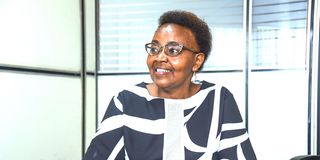
Wangu Githui during the interview on October 2, 2024 at JKUAT towers in Nairobi.
When she got to work, she did not tell a soul what was going on. Neither did she share with her family members. For three days, she fixated on work.
“I then called my sister and told her to come home. I knew my husband comes home on Fridays so he was also there when I shared. I told them, ‘I do not want any tears because of this thing I am fighting,’” she says.
Additionally, the MRI results had indicated that Wangu needed another biopsy that would punch the skin, which she did and had to wait for 10 days.
“Those were the longest days ever. That time, I would have lost it. For a cancer patient, one day is too long. By that time, the lower side of the breast is pitch black from the nipple down,” she recalls.
The first biopsy revealed that she was okay but the second one delved into details showing her where it was, how far it had gone, and what type it was.
“This is when I knew cancer, here we come; and cancer here we fight,” Wangu recalls.
Before doing the positron emission tomography (PET) scan – a type of imaging test that shows how organs and tissues are working – Wangu, her husband, her sister, and her brother-in-law decided to tell the children.
“We disguised the meeting as a family lunch. I remember them sitting on the carpet. I told them everything up to where we were. That day, they did not talk. They regrouped, let it all out then moved the journey with me. When my girls cried, I shed just a little but my son just said ‘by now cancer should have a cure’ before exiting the conversation. Up until then, my body was numb, still in denial,” she says.
After her children, Wangu told all her siblings and urged them not to bother her with questions and only wait for her to volunteer the information.
“I’m an orphan, but I drove all the way to Nyeri to my mother-in-law and told her. Everyone who needed to know knew from me even before I started treatment,” she says.
Treatment journey begins
From February to July 2023, Wangu was on chemotherapy (chemo).
“I was given eight sessions, which I did after every three weeks. After chemo, I was told that they would do a radical mastectomy — surgery to remove the whole breast, all of the lymph nodes under the arm, and the chest wall muscles under the breast.”
After the first session, Wangu knew that her hair would fall, so she went to buy wigs accompanied by her children. As she was paying up, she accidentally pricked herself but her blood would not clot.
“I remember it was on a Saturday and there were tests we had done in the morning that were mandatory before the next session. So, when we went to pick them up, everything was zero. I had no platelets, scattered white blood cells, low haemoglobin levels…”
Wangu sent the results to her doctor and she was advised to get to the hospital immediately.
“Since my body was not responding well to chemo, my shift moved from after every two weeks to three before breaking down the dosage to every single Monday. One of the key things for chemo to work is platelets…Were they ever there? Aki no! I struggled. So many times, I missed sessions because they could not reach the threshold needed,” she says.
However, the severity of what her body was going through and what would become of her had not yet clicked for Wangu until her doctor nudged her to seek the services of a professional counsellor.
At this time, it was her second round of chemo but she was talking about it as if it was a casual story she was giving.
“She (my counsellor) realised I was not in my senses as far as this disease was concerned. She helped me reconcile Wangu, the disease, and where I was and that is when I cried for two days non-stop. With that, I was able to pick myself, the disease, and the journey we are on,” she says.
All through, Wangu never had a special diet and her doctor only advised her to increase her intake of vegetables and fruits.
“She was very particular against eating and drinking herbal stuff. In fact, she told me, ‘Don’t mix me up; let me fail with my medication.’ Actually, I cherished ugali-sukuma even more.”
While hair loss was inevitable, Wangu recalls that the moment it started shedding, she cut hers with scissors and affirmed herself because she did not let it fall off. Aside from that, she had black nails, and her skin got discoloured, especially on her nose. She also lost weight.
“In this journey, the whole thing that bothered me was wearing a wig. That killed me. So, when the hair grew just a little bit, I threw away the wig.”
With the struggles of chemo, Wangu stopped at seven sessions. She remembers that she fell ill, was hospitalised and given three weeks to recover before being booked into surgery.
Enter surgery and radiation
On Tuesday, August 8, 2023, Wangu walked in the corridors of the hospital, changed, then proceeded to the theatre. She did not want to be wheeled.
“The procedure (radical mastectomy) will take one hour and by then we will have finished.”
Those are the last words she heard before anaesthesia kicked in.
When Wangu was waking up, her family members were still there, waiting for her.
On Thursday, August 10, 2023, Wangu was discharged.
“Draining was a bit of an issue mentally. It was not a good thing to see and the doctor removed them to dry up. I experienced fluid retention. It was not that bad but it is still a journey,” she says.
However, ahead lay another hurdle — dressing.
“There are clothes that could not fit me well and I could not [reduce] them…so up to date, that has been an issue. Balancing the two members is not easy .”
While it was frustrating, and it still is to some degree, Wangu recalls telling her doctor that she wanted to go back to her former self.
“She affirmed me by saying, ‘Let’s cope with what we have. Remember, that breast did not define you. We removed the disease.’ So, I started going to the mirror, balancing them and moving on. I like the hair, though it came with a different texture.”
After her wound dried up, Wangu says she started radiotherapy and did 15 sessions. Radiotherapy was done every day Monday through Friday for three weeks.
“I did it well and I had no pain; only a beaten-up body. After the 15 sessions, pain kicked in for about two weeks and I lost six kilos because swallowing was a battle,” she says.
Now, a year down, Wangu keeps on affirming herself saying, “You made it. This far, you have done it and nothing should stop you from living your life the way you want it to be.”
She remarks: “So far, I’m unable to walk through high heels. But everything else, I have reclaimed.”
To that person who has just found out they have breast cancer, Wangu says, “Let the cancer stages remain with the doctor, and do not let them scare you. Listen to what your doctor says and do not conceal any information. Do not listen to third parties. For everyone else who has no cancer, please do not ask patients which stage they are in. It is none of your business and it is very demeaning.”
Though she was treated to negative comments from close family members, Wangu says she would chase them away from her house or not respond to calls and messages.
“Even though you heard it, do not ask me about it until I volunteer the information. Also, I made it a rule, nobody comes to see me past 6pm if you do not sleep there,” she says.
In the same breath, Wangu had a good community of friends and family.
“There is this one friend whom, when I told her, never asked about it again. She would visit with some foodstuff, sometimes she cooks, we dine, and she goes. [It happens] up to date,” she says.
A key highlight of her journey is the support she got.
“I never felt alone. My boss, immediate family members walked with me,” she says.
***
Itchiness? It could be from the fleas of the cats or dogs
Like Wangu’s case, in April 2022 Annabelle Kanyari, 57, started scratching on the side of her left breast as she was showering. For two days, that was the case and the itch would continue even after drying and dressing up.
“On the third day, the itchiness was still there and I thought to myself that it could have been from the fleas of our cats and dogs since I love playing with them,” she recalls.
Fortunately for Annabelle, her firstborn daughter is a pharmacist. She told her to go to the doctor.
“My husband echoed her and incidentally, that day I never argued. I’m very argumentative, but that day I complied. We go to the clinic and I think he will just remove the flea. Instead, he asks, ‘Have you ever done a mammogram?’ I’m puzzled wondering why yet it’s an insect that is causing me issues. But he orders for a mammogram there and then,” she remembers.
The results showed that she had a suspicious-looking growth. Annabelle was sent for an ultrasound the next day and the results said: “Suspicious-looking lump.”
A day after, Annabelle booked for an ultrasound-aided biopsy, alongside her armpit and lymph nodes, and waited two weeks for the results.
“Since I could not understand the results, I took a [photo] and sent it to my daughter. She did not respond to me that night and enquired the next day when I was seeing my doctor. Then, I was on my way and she informed me that it was not a big thing.”
After salutation and the doctor reading through the results, Annabelle was informed, “These results show you have cancer.”
Unfazed, Annabelle started to laugh, left the doctor’s office and called her son to listen to what the doctor was saying.
The doctor reiterated, “These results show you have cancer and the funny thing is that you are the earliest patient I have ever dealt with in my life.”
“But I did not have a lump,” she interjected.
“Yes. It is painless and has no lumps and had you not come now, it could have taken you five years and by then it could have been Stage 4. It was in Stage 1A.”
Annabelle was advised to remove the whole breast, with an optional chemotherapy session but a mandatory radiotherapy.
On the night before Wednesday May 11 when Annabelle’s family was supposed to have a sit-down with the doctor, her daughter encouraged her to remove the whole breast saying, ‘Ukifagia nyumba, unaosha. (When you are sweeping the house, follow it up with mopping).’
The following week, Annabelle got to surgery and her breast was removed together with some lymph nodes. That was on a Monday. By Thursday morning, Annabelle went back home and travelled the following Tuesday to attend the burial of her mother-in-law.
That time, the wound was draining properly and the doctor advised her to do chemo after eight to 10 weeks, which was optional.
Asked if she had to follow a specific diet, she replied: “My doctor told me, ‘Eat anything you want.’ One thing I did was drop sugar, sugary foods and wheat foods. Incidentally, I liked ugali, sukuma and meat. I liked popcorn with chilli and blended juices.”
Chemo, surgery, radiotherapy and its effects
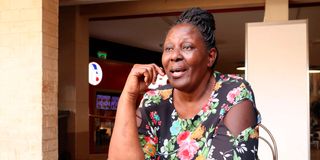
Annabelle Kanyari during an interview at Sarit Centre in Nairobi on October 30, 2024.
From July to November 2022, Annabelle did six rounds of chemo after every 21 days. A week in, her hair fell.
“I sat with scissors when my family members had gone, and by the second week, I was bald,” she recalls.
While her body was going through it all, having no appetite, nursing nausea and with black nails in hands and toenails, Annabelle’s family members humoured and supported her through these harsh times.
“My husband held me and told our children, ‘Nobody is going to handle my wife apart from me. This is your mother but she is my wife and I’m going to make sure I walk with her till the end.’ So, anything I needed – food, medicine, going to hospital – he and my children did it” says Anabelle.
Throughout the sessions, Annabelle says her husband never left the hospital bed until she was done.
“That was my first support. So, it never really sank in me what was going on. The only thing he refused to do is touch my bald head,” she says, laughing.
Asked if she ever received any negativity or discrimination, she replied: “Not as much because my family members shielded me. But there was this pastor who came to visit us when I was going through chemo and it hurt all of us. He looked at me and said, ‘nilikuangalia sura nikaona umekauka…umekauka sana (I looked at you and saw you were very pale). I never looked at him but my children took it personally and asked my husband to tell him never to visit.”
After the chemo, in August, Annabelle did 15 radiotherapy sessions and by December 22, she finished her sessions.
“I told my doctor, ‘I’m done, anything else?’ He said, ‘You do not have any cancer.’ ‘So, can I go on holiday? ‘Yes, so long as you do not let the water touch the area where the radio was done.’ We went to Malindi and I did enjoy.”
In January 2023, Annabelle went for a clinical visit and the doctor affirmed to her she was doing okay but told her to visit again in April for a PET scan.
“I was A+. Not a single cell of cancer was in my body. You’ve dealt with it so harshly that it cannot look at you.”
Asked if she had moments when she wondered why this was happening to her , she replied: “No. My husband got to that point of ‘why my wife’? and I looked at him and asked, ‘Why not your wife?’ I have never had a reason to be in hospital or see a doctor.”
Listening, ignoring and wishing it away
While having cancer is different from knowing about it, Annabelle recalls that 5-6 years ago, as they were planning a wedding for a friend’s daughter, a woman (Madam Mureithi) boldly talked about cancer to the women there.
“She had been there and was celebrating seven years and hers did not present with a lump. So, she emphasised on the importance of screening every so often. I would listen, ignore and wish it away. When I was told, she was the first person I called,” she says.
Additionally, Annabelle says one of her friends told her that the cancer was just a homa (cold) and urged her to listen to her doctors.
“How you deal with it is plugging earphones in your ears. I would sing all these gospel songs and it never sank into me,” she says.
Two years down the line, Annabelle advises: “Avoid over-the-counter drug, make a quick decision on what next when your doctors inform you, have at least basic insurance and have a support system.”
***
Dry, itchy breast
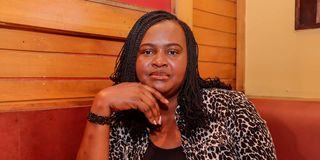
Aileen Ithima during an interview at Yaya Centre in Nairobi on October 30, 2024.
Before Covid-19 shook the world in 2020, Aileen Ithima’s world had already been shaken. The 42-year-old’s left breast nipple was dry and extremely itchy.
She went to the hospital and was given some antibiotics. Two weeks later, Aileen started itching again and went back to the hospital.
“They did tests and told me it was not cancer since I did not have lumps. They, however, gave me more antibiotics. The third time, I scratched the nipple until I bled when I was having my periods,” she recalls.
She went to hospital and the doctor referred her to another hospital.
In 2021, Aileen did an ultrasound and the results confirmed to her she had duct ectasia, a benign (non-cancerous) breast condition that occurs when a milk duct in the breast widens and its walls thicken.
“I was advised to continue taking antibiotics and if the symptoms persist, I do a surgery to remove the blocked duct. I went home and celebrated because what I was expecting was not it,” she says.
However, every time when she was almost having her periods, Aileen says, she would itch on her left breast’s nipple and it would bleed.
“Since there was no cause of alarm per se, I used to go in and out of clinics to get antibiotics and ointments to apply because it was like a wound,” she says.
Enough is enough
So, between 2021 and 2022, Aileen did that and in 2023, she decided enough is enough. By this time, the nipple looked as if it was burnt and the areola (darker skin surrounding the nipple) would look as though something was cutting it from inside.
“I went to my gynaecologist who referred me to an oncologist. I saw him in April 2023 and he advised me to a do biopsy and google Paget’s disease (a rare condition associated with breast cancer) when I go home. That doctor broke me,” she says.
That day, Aileen had a rough day at work. She informed her boss who advised her against going to that doctor again.
The next day, Aileen went to a different doctor who advised her to do an ultrasound and mammogram.
“In the ultrasound room is when I knew something was bad. She kept pressing on in some areas and then insisted that I had to see an oncologist that very day. I was alone; so after the procedure, I went and cried so much before calling my boss,” she recalls.
While there was no reason to worry at that point, Aileen was asked to book an ultrasound-guided biopsy, with results expected in two weeks.
“Before the two weeks elapsed, I was called back and was requested to do a computed tomography (CT) scan,” she says, adding that the scan was to target her chest and abdomen.
On the day of her appointment, Aileen was informed that she had Stage 3 cancer.
“Before getting it, I knew it was a death sentence. Being a single mum, my brain was only thinking about my two children. I wondered how I was going to break the news to my mum and siblings. It was not easy. I went to work to distract myself,” she says.
Chemo, surgery, radio and huge appetite
Two weeks after receiving the results, Aileen was scheduled to undergo eight chemotherapy sessions, one every 21 days, starting in June 2023. Though chemo was harsh, Aileen never missed work as much.
“I did not want people to start asking why I was not at work; so I put up a face.”
Like Annabelle, Aileen’s hair fell off after her first chemo session. Initially, she says, her doctor had told her not everyone’s hair falls off and she thought to herself that she could be among those.
“So, as I was preparing to go to the salon for a flat iron, I decided to comb it — only for it to have a huge chunk of hair. This broke me. I cried and left for the nearest kinyozi for a haircut. I told them to only leave an inch-long cause I could not stand seeing my hair fall off.”
After the second chemotherapy session, Aileen recalls the inch-long hair was all on the floor.
“I remember I was taking a shower and had just lathered my head. As I was rinsing off, I wondered why there was still soap, only to open my eyes and see the whole bathroom with hair. I screamed. I could not come to terms with the fact that I was bald. For an hour, I just sat in my towel, crying,” she remembers.
While she had been wearing wigs even before the diagnosis, Aileen wore one of them and went to work. In the process of treatment, her nails turned black and she had to put on a stick-on because of the nature of her job.
“When I was almost done with chemo, I got fluid retention, making me swell. Customers would ask me what was wrong and this question made me retract and stay in the office,” she says.
As the effects kept kicking in one after another, Aileen chose to give one of her sisters her ATM card and the other her Pin, just in case.
However, through it all, Aileen’s appetite was still there.
“I would vomit, be nauseous, diarrhoea and after visiting the washroom, I would pass by the kitchen for a snack,” she says.
On December 19, 2023, Aileen underwent a radical mastectomy and, three days later, she was discharged.
“What was challenging for me was explaining to my six-year-old what the drainage was. I took two months leave and started radiotherapy on January 12. I did 20 sessions.”
Now, Aileen is back to normal, only that she is on long-term medication.
Her message to cancer patients is: “Avoid people with negativity and follow your doctor’s advice.”
